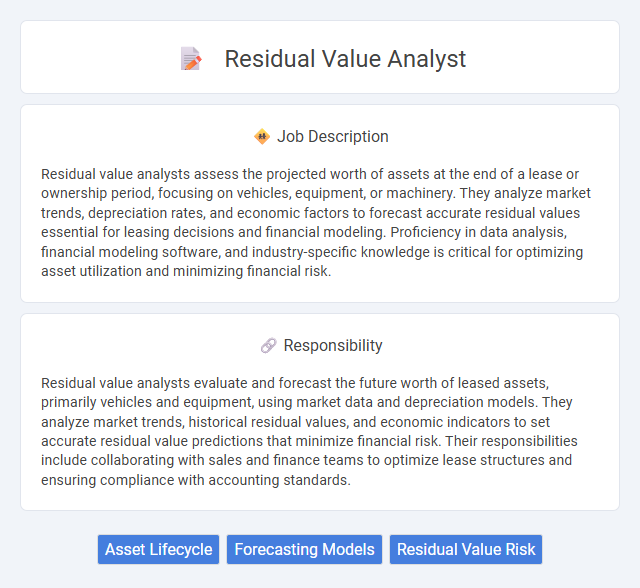
Residual value analysts assess the projected worth of assets at the end of a lease or ownership period, focusing on vehicles, equipment, or machinery. They analyze market trends, depreciation rates, and economic factors to forecast accurate residual values essential for leasing decisions and financial modeling. Proficiency in data analysis, financial modeling software, and industry-specific knowledge is critical for optimizing asset utilization and minimizing financial risk.
Individuals with strong analytical skills and attention to detail will likely find the role of a residual value analyst suitable, as it involves evaluating asset depreciation and market trends. Those comfortable with quantitative data and predictive modeling may have a higher probability of excelling in this position. Candidates who prefer dynamic problem-solving environments and possess a good understanding of finance and economics will probably adapt well to this analytical role.
Qualification
A Residual Value Analyst requires strong expertise in financial modeling, data analysis, and market research, often supported by a degree in finance, economics, or business administration. Proficiency in statistical software, Excel, and ERP systems is essential for accurate forecasting and valuation of asset residual values. Experience with automotive, leasing, or asset management industries enhances the ability to assess market trends and optimize residual value strategies effectively.
Responsibility
Residual value analysts evaluate and forecast the future worth of leased assets, primarily vehicles and equipment, using market data and depreciation models. They analyze market trends, historical residual values, and economic indicators to set accurate residual value predictions that minimize financial risk. Their responsibilities include collaborating with sales and finance teams to optimize lease structures and ensuring compliance with accounting standards.
Benefit
A Residual Value Analyst likely provides significant financial benefits by accurately predicting asset depreciation and end-of-lease values, which can improve profit margins for leasing companies. Their analyses may minimize risks associated with residual value fluctuations, supporting better investment decisions. Companies could experience enhanced forecasting accuracy and reduced financial losses due to their expertise.
Challenge
The role of a Residual Value Analyst likely involves the challenge of accurately forecasting asset values amid fluctuating market conditions and economic uncertainties. Maintaining precision in these predictions requires continual analysis of diverse data sources and adapting methodologies to evolving trends. Such complexity suggests that strong analytical skills and attention to detail are essential to succeed in this position.
Career Advancement
A Residual Value Analyst plays a crucial role in the automotive and leasing industries by assessing the future worth of leased vehicles, directly impacting financial forecasting and risk management. Career advancement opportunities often lead to senior analyst positions, portfolio management roles, or strategic planning jobs within finance departments due to expertise in data analysis, market trends, and asset valuation. Developing strong skills in predictive analytics, financial modeling, and industry-specific software enhances prospects for leadership roles or specialization in residual value strategy and consultancy.
Key Terms
Asset Lifecycle
A Residual Value Analyst specializes in evaluating the anticipated worth of assets at the end of their lease or lifecycle, ensuring accurate financial forecasting and risk management. This role requires deep expertise in asset depreciation trends, market demand fluctuations, and industry lifecycle patterns to optimize residual value projections. Effective analysis supports informed decision-making in lease structuring, asset disposition, and investment strategies within sectors such as automotive, equipment leasing, and technology.
Forecasting Models
Residual value analysts develop advanced forecasting models to predict the future worth of assets, using historical sales data, market trends, and economic indicators. These models integrate statistical techniques, machine learning algorithms, and scenario analysis to enhance accuracy in valuation estimates. Continuous refinement of predictive analytics tools allows analysts to adjust projections based on real-time market fluctuations and emerging industry patterns.
Residual Value Risk
Residual value analysts assess and manage residual value risk by forecasting the future worth of leased assets, such as vehicles or equipment, at the end of the lease term. They use market data, economic trends, and historical depreciation rates to mitigate financial losses associated with inaccurate residual value estimations. Expertise in residual value risk is critical for optimizing lease structures and maintaining profitability in asset financing portfolios.
 kuljobs.com
kuljobs.com